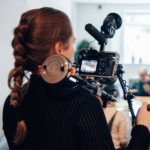The purpose of the school is to train people to be a member of society. “How can I distinguish good information from bad information”. He thinks that if you don’t know, you can’t navigate the society as freely as you would if you knew those basics.
So my name is Kim Belanger-Baillargeon
I was a high school teacher before, I taught history and geography for 5-6 years. At Éducaloi, we often say that the law is the rules of the game of society, so would you agree to play a board game with me if I didn’t explain the rules to you, I would just throw pawns on the table and I’d win for sure because you don’t know what the rules are, so that’s a little bit like it.
*Question 1*
Civil Law.
I couldn’t tell you.
Civil law.
I have absolutely no idea, I don’t know, isn’t it criminal law? Something like that?
Civil law.
*Question 2*
A wall that separates property shared by two people.
I feel like it’s kind of metaphorical, the wall, but I think it’s an actual wall.
I don’t know.
No idea.
*Question 3*
They’re like texts from old situations that have happened in courts that people continue to apply.
I wouldn’t know how to answer that question at all.
It’s like, if something happened in the past that was said in the courts
The history that has had in the past about similar cases.
It’s when the rules in the Supreme Court, like, that didn’t have law, rules that were dealt with in the past.
*Question 4*
I think that if you were to witness a crime you have to tell them because otherwise you become an accomplice.
Yes, I think so.
I think yes, I want to say yes.
No.
*Question 5*
If you’re ever stopped, maybe you should call the emergency services, but if not, no.
Yes, I think so, if it’s hooked up and it’s to put the coordinates of a destination.
Parked? It’s that its parked and your engine is off?
Unfortunately, I have to say that it doesn’t surprise me that much because the majority of people will start to know and understand a little bit about the legal system when they have a problem. So either when they go to read about the subject or consult a lawyer, a notary there. They will… they will try to find the solution to their problems they will really engage in their legal learning which is normal, we agree but most people I think especially younger who have not yet had to do legal problems necessarily. Well it navigates the society sometimes with forces the impression that come from American films. Sometimes with the impression that it is always the police who are going to regulate all the problems while certain actions that are not crimes must be regulated by the individuals themselves.
Accessibility to justice that people often perceive it that as having a trial, so people often think of accessibility to justice, they think of the delay in the treatment of certain complaints or before having a trial, but it’s not just that, in fact, access to justice, there are many people who don’t have access to justice in the same way as others, simply because they don’t know their rights and they don’t assert them in certain situations where they are not respected. So for us the accessibility to justice comes from the legal education because it is necessary to know its rights to make them hold worth.
That we go there with several ways first of all it is a challenge to be known in the school environments. So the first really strong program of Éducalois in the schools is the workshops in class. So we have a network of juris volunteers throughout Quebec, several hundred of them, who go to schools to give free workshops on law or justice in all sorts of ways, including quizzes, debates, simulated processes, but we think that it is not enough because from the youngest age, so from the beginning of primary school, we should initiate young people to the laws in a certain way when they are very small, we can talk to them about rules, they understand the rules at school, there are rules at home, there are rules in the street that everyone must respect in order to live well together. The young people are going to live the law or rules as something that is imposed over them by a structure that is on top, rather than as a co-construction as the law makes them there a co-construction so that all can live the best possible together.
A bit like mathematics, let’s say that I would say, ok it is absolutely necessary that everybody learns trigonometry. Trigonometry is complicated, we’ll start by talking about it in secondary 4, but that doesn’t mean that we don’t do math before we learn trigonometry because we’ve learned to add, subtract and multiply all along our school career. So we will understand the difference between civil proceeding and a criminal proceeding because we have spoken to about law and then about regulation and then about living together throughout our school career. As for the Ministry, yes we sometimes collaborate but that comes rather from their side, the future program culture and care Quebecois for which we participated in the consultations of reorganization and deposited memory with the Ministry to make an emphasis on the importance of the legal education in schools and then we think that that brings the fruits since the new course of culture and the history Quebecois includes a theme in secondary four which is called “legal education” therefore we are very happy.

